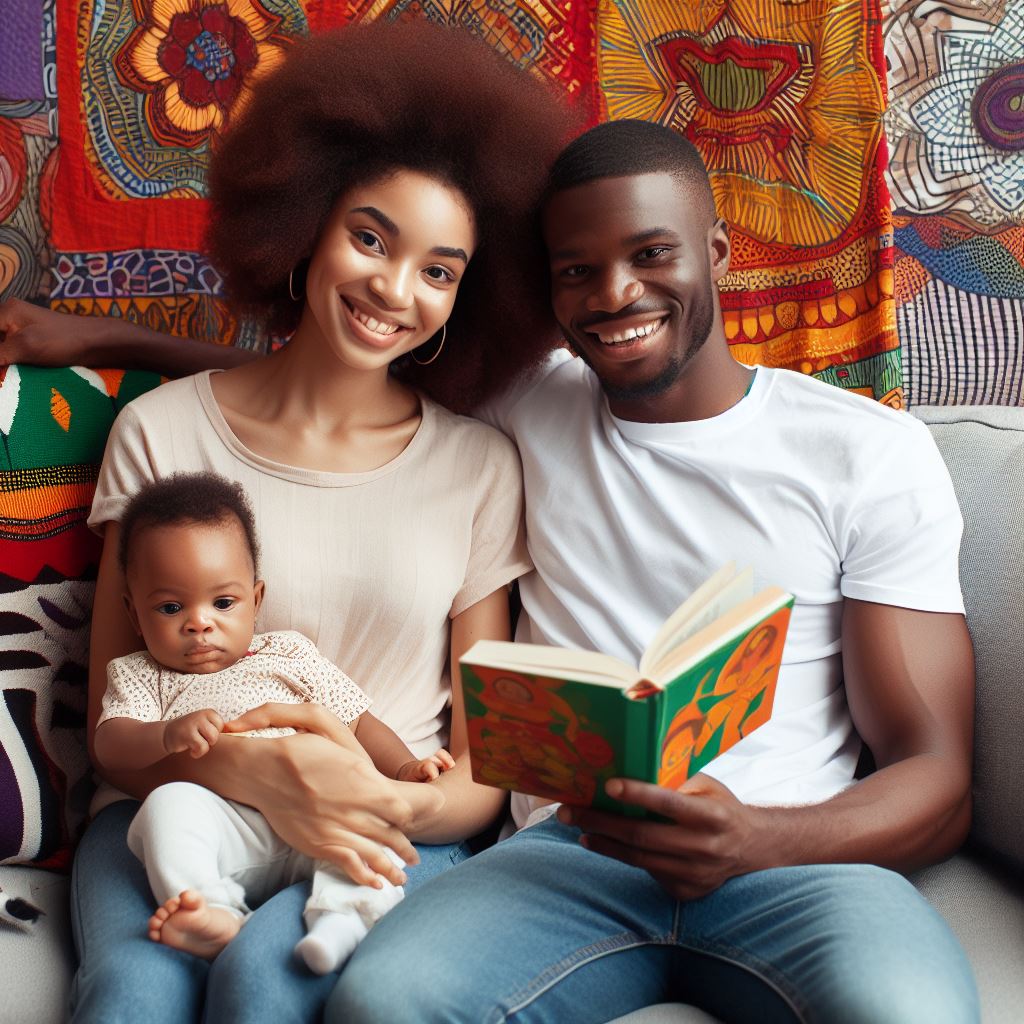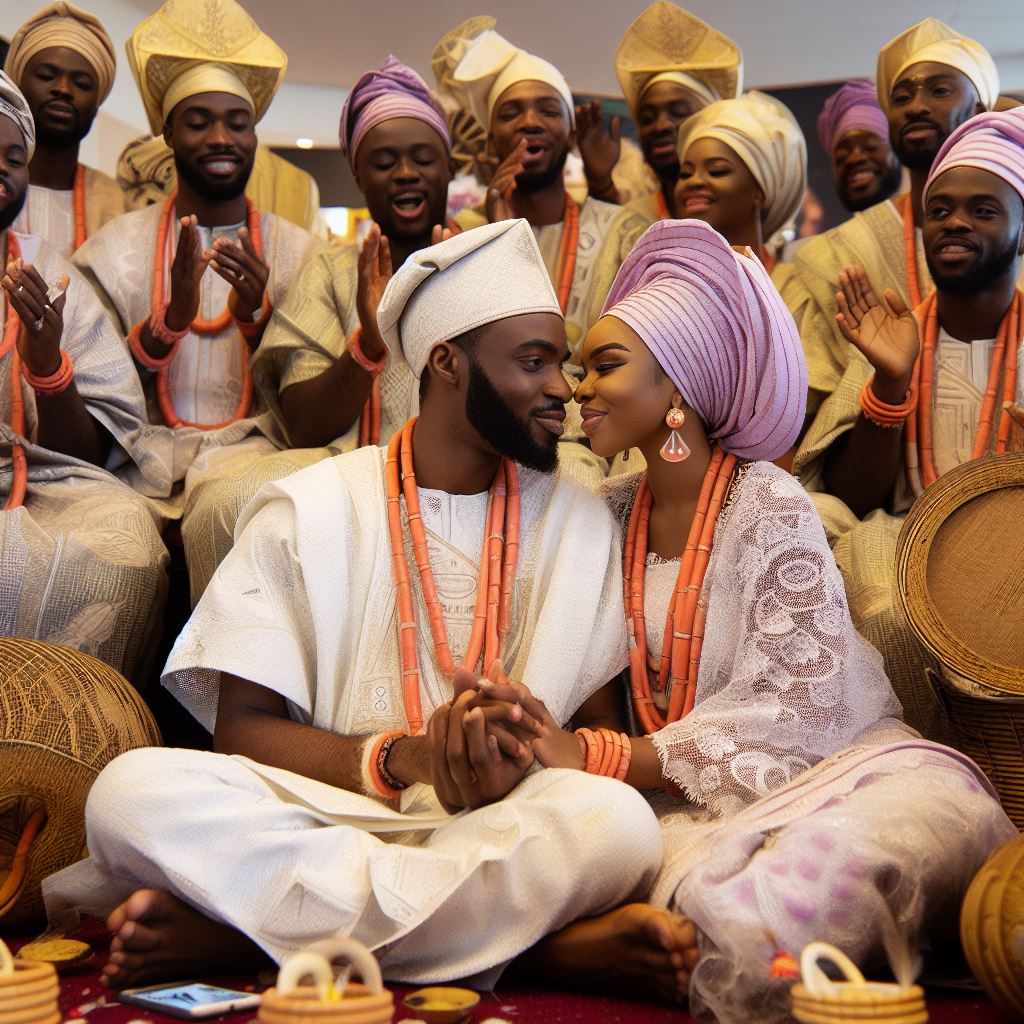Introduction
Defining Evolving Gender Roles
Evolving gender roles refer to the dynamic shifts in the societal expectations, responsibilities, and behaviors associated with individuals based on their gender.
These roles are in a constant state of transformation, reflecting changes in cultural, social, and economic landscapes.
Significance of Gender Roles in Marriages
Gender roles play a pivotal role in shaping the dynamics of marriages.
Traditionally, Nigerian marriages have been characterized by distinct roles for men and women.
Men were expected to be the primary breadwinners, while women assumed roles as homemakers and caregivers.
These roles were deeply embedded in the cultural fabric of Nigeria.
Importance of Exploring Implications for Marriages in Nigeria
Understanding the evolving nature of gender roles in Nigerian marriages is crucial for several reasons.
First, it allows us to adapt to contemporary societal changes.
As Nigeria’s economy shifts and opportunities diversify, the roles within marriages need to be redefined to promote equitable partnerships.
Second, this exploration helps address gender disparities.
Traditional gender roles often resulted in unequal power dynamics, with women being disproportionately burdened with household responsibilities and limited opportunities for personal and professional growth.
By examining evolving gender roles, we can work towards a more balanced distribution of power, responsibilities, and opportunities within marriages.
Third, exploring the implications of evolving gender roles is essential for harmonious marriages.
Conflicts may arise when individuals and couples grapple with the changing expectations and roles, making it essential to navigate these changes with empathy, open communication, and mutual respect.
In this blog post, we will delve deeper into the implications of evolving gender roles in Nigerian marriages, considering how they affect marital dynamics, family life, and individual well-being.
By doing so, we aim to contribute to the ongoing dialogue about how Nigerian marriages can adapt and thrive in our evolving society.
Traditional Gender Roles in Nigerian Marriages
Explanation of traditional gender roles
- In Nigerian marriages, traditional gender roles assign specific tasks and responsibilities to men and women.
- Men are expected to be the breadwinners, providing for the family financially.
- Women are traditionally responsible for taking care of the home and children.
- These roles are deeply embedded in cultural and societal norms.
Cultural factors influencing traditional roles
- Nigeria’s diverse ethnic groups have their customs, beliefs, and traditions that shape gender roles.
- Cultural factors like religion and societal expectations reinforce the adherence to traditional gender roles.
- The patriarchal nature of Nigerian society plays a significant role in maintaining traditional gender roles.
- Societal pressure and fear of judgment often prevent individuals from deviating from these roles.
Effects of traditional gender roles on marriages
- Traditional gender roles can create an imbalance of power within marriages.
- Women may feel restricted and limited in their choices and aspirations.
- Men may face immense pressure to fulfill the provider role, leading to stress and strained relationships.
- Traditional gender roles can hinder individual growth and the development of egalitarian partnerships.
- Gender role expectations can lead to unequal distribution of household chores and childcare responsibilities.
- These inequalities can contribute to resentment, dissatisfaction, and conflict within marriages.
- Traditional gender roles may also impact women’s economic independence and access to resources.
- The rigid adherence to traditional roles can limit the possibilities of shared decision-making and compromise.
- Marriages that strictly adhere to traditional gender roles may hinder the exploration of new ideas and perspectives.
- Challenging or breaking away from traditional gender roles can lead to societal criticism and ostracization.
Basically, traditional gender roles in Nigerian marriages are deeply rooted in cultural and societal norms.
Men are expected to be breadwinners, while women are responsible for domestic tasks.
These roles restrict individual growth and can create an imbalance of power.
They can also contribute to dissatisfaction, conflict, and unequal distribution of responsibilities.
Challenging these traditional roles may lead to societal criticism.
However, it is important for marriages to evolve and adapt to more egalitarian partnerships for the well-being and happiness of both spouses.
Read: Marriage & Gender Roles: A Nigerian Perspective on Definitions
Shifts in Gender Roles in Modern Nigerian Society
Factors contributing to the evolution of gender roles
- Education: Increased access to education has empowered women and challenged traditional gender norms.
- Urbanization: As more Nigerians migrate to cities, traditional gender roles become less practical and adaptable.
- Economic changes: The rise of Nigeria’s middle class and the growth of industries have created new opportunities for both genders.
- Influence of globalization: Exposure to different cultures and ideas through media and technology has influenced societal expectations.
- Emergence of feminist movements: Women’s rights activism has played a significant role in challenging gender norms.
Examples of changing gender dynamics in Nigeria
- Economic participation: Women are now seeking employment outside the home, contributing to household finances.
- Politics: More women are entering politics and occupying positions of power, challenging the male-dominated political landscape.
- Education: Girls are gaining equal access to education, leading to increased female enrollment and academic achievements.
- Household responsibilities: Men are increasingly involved in domestic tasks, such as cooking, cleaning, and childcare.
- Fashion and self-expression: Traditional gender-specific clothing is being replaced by modern, gender-neutral fashion trends.
Impact of shifting gender roles on marriages
- Power dynamics: Traditional roles of dominance and submission are being replaced by more egalitarian partnerships.
- Decision-making: Both partners now have a say in important family matters, leading to better communication and collaboration.
- Division of labor: Couples are redefining household responsibilities based on personal strengths and preferences.
- Relationship satisfaction: Gender equality promotes healthier relationships and reduces conflicts caused by unequal power dynamics.
- Support systems: As gender roles evolve, couples are adapting to new expectations and seeking support from family, friends, and communities.
Generally, Nigeria is experiencing significant shifts in gender roles due to various factors.
Increased education, urbanization, economic changes, globalization, and feminist movements have all contributed to these shifts.
Examples of changing gender dynamics can be seen in various areas such as economic participation, politics, education, household responsibilities, and fashion.
These changing gender roles have had a significant impact on marriages, leading to more egalitarian partnerships, improved decision-making, redefined division of labor, increased relationship satisfaction, and a need for support systems.
As Nigerian society continues to evolve, it is crucial to embrace and support these shifts for the betterment of individuals, families, and the nation.
Read: The Role of Family in Strengthening Nigerian Marriages

Implications for Marriages in Nigeria
Changing expectations and obligations within marriages
- The evolving gender roles in Nigeria have led to changing expectations within marriages.
- Traditional roles and responsibilities are being challenged as men and women strive for equality.
- Women are no longer solely responsible for household chores and child-rearing.
- Men are increasingly expected to contribute to household chores and share parenting responsibilities.
- This shift in expectations can create a more balanced and equitable marriage dynamic.
- Both partners have the opportunity to pursue personal and professional goals without being limited by gender roles.
- Marriages based on mutual respect and shared responsibilities tend to be more successful.
Effect on marital satisfaction and communication
- As gender roles evolve, marital satisfaction can be greatly influenced.
- Couples who embrace egalitarianism and effective communication tend to experience higher satisfaction.
- Open and honest communication about expectations and desires is essential in modern marriages.
- Mutual understanding and compromise are key for resolving conflicts that may arise from shifting roles.
- Marital satisfaction is often linked to a sense of partnership and shared decision-making.
- Healthy communication allows couples to navigate the complexities of changing gender roles.
Potential challenges and conflicts arising from shifting gender roles
- While changing gender roles have many positive effects, challenges may arise.
- Ongoing societal and cultural norms can exert pressure on couples to adhere to traditional roles.
- Conflict may arise when one partner feels constrained by societal expectations and wants to challenge them.
- Resisting societal pressures requires commitment, support, and understanding from both partners.
- Couples may face external criticism and judgment from family, friends, and society at large.
- It is important for couples to create a supportive and inclusive environment within their marriage.
- Education and awareness about evolving gender roles can help overcome potential challenges and conflicts.
- Marriages that embrace flexibility and adaptability are better equipped to navigate the changing landscape.
Essentially, the evolving gender roles in Nigeria have significant implications for marriages.
Changing expectations and obligations within marriages lead to a more balanced and equitable dynamic.
Marital satisfaction is greatly influenced by how couples communicate and navigate shifting gender roles.
While challenges and conflicts may arise, creating a supportive and inclusive environment within the marriage can help overcome them.
It is essential for couples to embrace flexibility and adaptability while challenging societal norms. Ultimately, marriages that embrace evolving gender roles are more likely to thrive.
Read: The Role of Tradition in Nigerian Marital Conflicts
Coping Strategies for Couples
Open and Honest Communication
One important coping strategy for couples is to maintain open and honest communication.
This means that both partners should feel comfortable expressing their thoughts, feelings, and concerns without fear of judgment or reprisal.
By fostering a safe environment for dialogue, couples can address any issues that arise due to evolving gender roles.
In the context of evolving gender roles in Nigeria, open and honest communication can help couples navigate the changes and challenges that come with shifting societal expectations.
It allows partners to express their needs, desires, and expectations regarding their roles within the marriage and household.
By openly discussing their feelings and concerns, couples can avoid misunderstandings and resentment.
Additionally, communication enables couples to jointly redefine their roles and responsibilities based on mutual agreement and a clear understanding of each other’s perspectives.
This process fosters mutual respect and cooperation.
Balancing Household Responsibilities
Another coping strategy for couples is to find ways to balance household responsibilities effectively.
Traditionally, gender roles dictated that women were primarily responsible for domestic chores, while men focused on providing financial support.
However, evolving gender roles in Nigeria challenge this traditional division of labor.
Both partners should collaborate and find a balance that suits their individual preferences and circumstances.
This may involve redistributing household chores based on each person’s strengths, interests, and availability.
For example, a couple could divide tasks such as cooking, cleaning, and childcare based on their personal abilities and schedules.
Striking a balance in household responsibilities ensures that neither partner feels overwhelmed with the burden of maintaining the home, allowing them to enjoy a healthy work-life balance.
This balance promotes a more equitable relationship and prevents one partner from feeling taken advantage of or unduly burdened.
Supportive and Egalitarian Attitudes
Lastly, couples can cope with evolving gender roles by cultivating supportive and egalitarian attitudes.
This involves recognizing and respecting each other’s contributions, regardless of traditional gender roles or societal expectations.
Supportive and egalitarian attitudes promote a sense of partnership, teamwork, and respect within the marriage.
Couples can encourage and uplift each other, acknowledging the efforts and sacrifices made by both partners in maintaining the relationship and managing household responsibilities.
By rejecting gender stereotypes and embracing equality, couples can navigate evolving gender roles more effectively.
This includes being supportive of each other’s ambitions, career choices, and desire for personal growth.
It also entails encouraging open dialogue about gender expectations, societal pressures, and the challenges faced in a changing social landscape.
In general, coping with evolving gender roles in Nigeria requires couples to adopt various strategies.
Open and honest communication helps partners express their thoughts and concerns, leading to a deeper understanding of one another.
Balancing household responsibilities ensures an equitable distribution of tasks, preventing one partner from being overburdened.
Lastly, supportive and egalitarian attitudes foster respect and equality within the relationship, enabling couples to navigate the challenges of changing gender roles harmoniously.
Read: The Role of Witnesses in Securing a Nigerian Marriage Certificate
Conclusion
Recap of evolving gender roles and their implications
Throughout this blog post, we have explored the evolving gender roles in Nigeria and examined their implications on marriages.
We have seen how traditional roles are shifting, with women becoming more empowered and men taking on new responsibilities.
Importance of adaptability and compromise in modern marriages
It is clear that in order for marriages to thrive amidst these changing dynamics, adaptability and compromise are essential.
Both partners must be willing to adjust their expectations, share household and child-rearing responsibilities, and support each other’s ambitions.
Encouragement for continued exploration and discussion
As Nigeria continues to evolve, it is crucial for society to engage in open and ongoing dialogue about gender roles and their impact on marriages.
By challenging traditional norms and embracing progressive attitudes, we can create marriages that are built on equality, respect, and shared happiness.
In a nutshell, the transformation of gender roles in Nigeria presents both challenges and opportunities for marriages.
By embracing adaptability, compromise, and ongoing exploration, couples can forge stronger, more fulfilling partnerships.
Let us strive for marriages that embrace equality and empower both partners to thrive in this evolving society.




